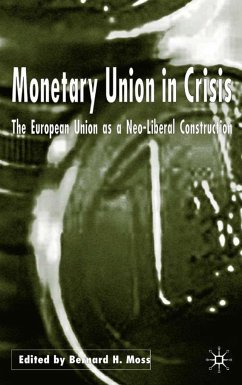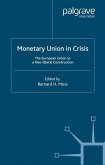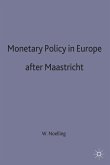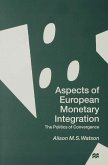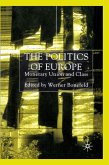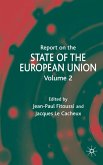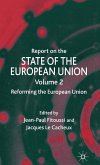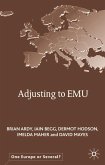This volume presents a radical reinterpretation of the European Community or Union as a neo-liberal construction. It was neo-liberal rather than classically liberal because it was designed and used as an external instrument to weaken the interventionist welfare state that protected working people and strengthened the hand of labor. It was founded on the vision of a free market untrammelled by public intervention and worked to ensure competition, sound money and profitability against the inflationary force of workers and unions and the welfare state. Monetary union in particular restored profitability but produced slow growth, mass unemployment, and insecurity and came under challenge, most dramatically in France, by working people from below. This view is substantiated by an economically based study of member-state performance and complemented by a series of national studies on the monetarist turn by leading scholars.
Hinweis: Dieser Artikel kann nur an eine deutsche Lieferadresse ausgeliefert werden.
Hinweis: Dieser Artikel kann nur an eine deutsche Lieferadresse ausgeliefert werden.
'This is a useful study which offers a critical and original assessment of the process of European integration. Bernie Moss tackles the neoliberal roots of the European project from the Treaty of Rome onwards. He shows how the EU pro-business agenda has been sustained over time and analyses its impact on the member states' economies. This approach is further substantiated by a number of contributions on national contexts written by a group of experts. This work should be welcome by students and scholars working on the EU. It is published at a crucial time following the enlargement to Central European countries and the debate on the European Constitution. This well documented and challenging study provides key explanations to the social and economic problems that the EU is currently facing.' - Dr Philippe Marlière, Senior Lecturer in French and European Politics, University College London, UK
'This is a useful study which offers a critical and original assessment of the process of European integration. This work should be welcome by students and scholars working on the EU. It is published at a crucial time following the enlargement to Central European countries and the debate on the European Constitution. This well documented and challenging study provides key explanations to the social and economic problems that the EU is currently facing.' - Dr Philippe Marlière, Senior Lecturer in French and European Politics, University College London, UK
'Thisbook is a very good analysis of the European venture and its remorseless drive to ever-closer union, particularly via monetary union. It brings it all down to basic economic dynamics, rather than the naive arguments for and against.' - Austin Mitchell, MP, Socialist Campaign Group News
'Monetary Union in Crisis is a timely reminder that many of the problems which the European Union faces are even more deep-seated that the current rows over the EU's Constitution and its budget.' - Councillor John Mills, Camden New Journal
'This is a useful study which offers a critical and original assessment of the process of European integration. This work should be welcome by students and scholars working on the EU. It is published at a crucial time following the enlargement to Central European countries and the debate on the European Constitution. This well documented and challenging study provides key explanations to the social and economic problems that the EU is currently facing.' - Dr Philippe Marlière, Senior Lecturer in French and European Politics, University College London, UK
'Thisbook is a very good analysis of the European venture and its remorseless drive to ever-closer union, particularly via monetary union. It brings it all down to basic economic dynamics, rather than the naive arguments for and against.' - Austin Mitchell, MP, Socialist Campaign Group News
'Monetary Union in Crisis is a timely reminder that many of the problems which the European Union faces are even more deep-seated that the current rows over the EU's Constitution and its budget.' - Councillor John Mills, Camden New Journal

